Free radicals are not your patients’ friend.

Free radicals, antioxidants, and cell damage are just some of the buzz words around health these days.1
We have trillions of cells in our bodies that are constantly facing various hazards. These threats can be due to lack of food or types of infections. A constant threat comes from chemicals called free radicals, which are the waste substances or by-products formed when the body processes food and reacts to the environment.1,2 Free radicals are also formed after exercising or exposure to cigarette smoke, air pollution, and sunlight.2
When the body cannot process and remove free radicals efficiently, you may suffer from oxidative stress which can harm cells and body function. In fact, oxidative stress has been linked to heart disease, cancer, arthritis, stroke, respiratory diseases, immune deficiency, emphysema, Parkinson’s disease, and other inflammatory conditions.1
To counteract the harmful effects of free radicals, the body produces antioxidants2 which are molecules that fight and neutralise free radicals in the body3, to boost overall health.1
Antioxidants came into the spotlight in the 1990s when scientists began to understand that free radical damage was associated with the early stages of certain chronic diseases as well as being linked to cancer and vision loss. Some studies showed that people with low intakes of antioxidant-rich fruits and vegetables were at greater risk for developing these chronic conditions, compared to those people who ate adequate amounts of antioxidant rich foods.2
Antioxidants come in a range of forms, including from vitamin C, vitamin E, and beta-carotene, as well as minerals like manganese and selenium. There are also other carotenoids and flavonoids and polyphenols, with different antioxidants having different effects on the cells of the body.4
For most healthy adults, the antioxidants contained in a healthy diet rich in fruits and vegetables would be enough to combat most of the free radical damage occurring in our bodies. Unfortunately, most people fall far short of meeting recommended daily intakes for vitamins like C and E.4 Another consideration is that high doses of antioxidant supplements can be harmful1, so care needs to be taken if choosing to supplement.
It is for this reason that low-dose supplements may be beneficial if your patients are deficient in certain nutrients or unable to follow a healthy diet.3
A combination supplement that contains low doses of antioxidants like vitamin c, zinc, Alpha-lipoic acid, beta-carotene, selenium, glycine, and vitamin E, may contribute to cell protection from free radical damage.
REFERENCES:
- Medical News Today. How Can Antioxidants Benefit Our Health (2018) at https://www.medicalnewstoday.com/articles/301506#supplements (website accessed on 5 June 2023)
- Harvard T.H Chan School of Public Health. Antioxidants (2023) at https://www.hsph.harvard.edu/nutritionsource/antioxidants/ (website accessed on 5 June 2023)
- Antioxidants Explained in Simple Terms (2019) at https://www.healthline.com/nutrition/antioxidants-explained#what-they-are (website accessed on 5 June 2023)
- The Truth About Antioxidants (2013) at https://healthland.time.com/2013/08/06/the-truth-about-antioxidants/ (website accessed on 5 June 2023)









